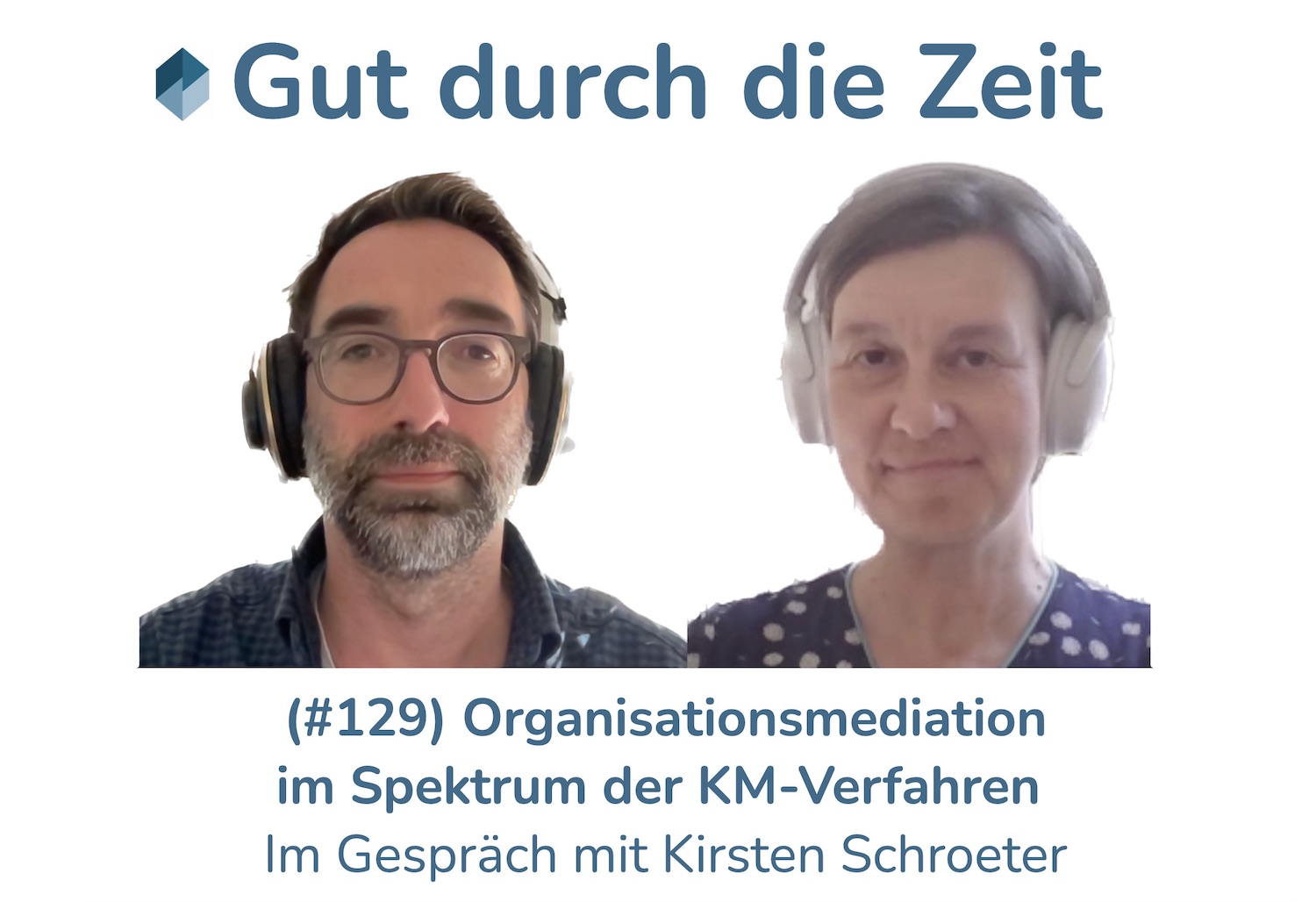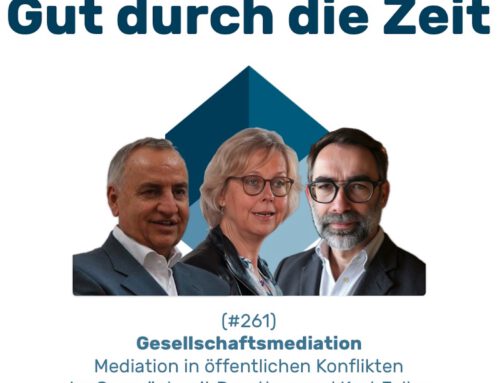INKOVEMA Podcast „Well through time“
#129 – Organisational mediation in the spectrum of conflict management methods
What options organisations have for dealing with conflicts. In conversation with Kirsten Schroeter
Well through time. The podcast about mediation, conflict coaching and organisational consulting.
Kirsten SchroeterDipl.-Psych., mediator and supervisor, specialising in: Conflict management in organisations through conflict counselling, mediation in conflicts and support for organisations in the development of their own conflict management. Academic director of the Master's programme in Mediation and Conflict Management at the European University Viadrina, co-editor of the series "Interdisziplinäre Studien zu Mediation und Konfliktmanagement" (Nomos) and member of the editorial board of the journal "Konfliktdynamik. Negotiation, Mediation and Decision-making in Business and Society".
Contents:
In this episode, Dr Sascha Weigel talks to qualified psychologist and mediator Kirsten Schroeter about various aspects of organisational mediation – and its development over time.
- On the practice of mediation in, with and through organisations:
They discuss the importance of mediation in organisations and how it compares to other conflict resolution methods. Kirsten notes that mediation in organisations is increasingly seen as a success story. More and more organisations are recognising the value of mediation and integrating it into their conflict management portfolio. There is also an increased awareness of when mediation is appropriate and when it can be combined with other processes.
A central topic is the practical implementation of mediation in organisations. It is emphasised here that the importance of a differentiated clarification of the mandate prior to mediation cannot be overestimated: It is crucial that the goals and expectations of all parties involved are clearly defined in order to facilitate effective conflict resolution. Good preparation on the part of the mediator is essential in order to position themselves professionally in advance and present a credible image.
In addition, the actual mediation is of course crucial. Successful mediation often requires support for the parties to ensure that the agreements are honoured and that the relationship is improved in the long term. The mediator can help the parties to implement the agreements reached. In large organisations, it can also be useful to work with sub-groups during mediation. This allows specific issues and interests to be dealt with in a more targeted manner. It can be helpful to include different perspectives and interests in order to find a comprehensive solution.
They also talk about the decline in litigation and the role of mediation in this context. Although there is no precise data on the volume of mediation, Kirsten has seen an increasing demand for mediation in her own practice. There is a shift from other processes such as team development to mediation. Organisations have become more open to addressing conflicts and dealing with them through mediation.
The question of whether mediation is seen as a separate method or whether there is a shift towards other forms of counselling is also discussed. Kirsten sees a trend towards professionalisation in dealing with conflicts and the use of different methods. The cost of conflicts and the desire to retain employees are further reasons why organisations are increasingly using mediation.
- Confidentiality and structural conflicts
Another important point is the confidentiality of mediation and its impact on structural conflicts in organisations. Whilst confidentiality helps parties to communicate openly and honestly, it has also been pointed out that this can lead to structural conflicts and grievances going undetected. A dilemma of mediation that points to the dark side of this process!
It is therefore important to also consider the possibility of (internal) publicity in the context of confidentiality. This can mean that certain findings or solutions are also made accessible to other employees or even society as a whole in order to learn from them and bring about change at an organisational or societal level. It is pointed out that the confidentiality of mediation can lead to structural conflicts and grievances in organisations remaining undetected and not leading to real change. It is emphasised that it is important to think beyond confidentiality and consider possible publicity in order not to miss out on learning opportunities for society.
- Distinction between mediation and clarification support
Another aspect is the distinction between mediation and clarification support. The question is often asked whether a particular process is mediation or not. Sascha and Kirsten emphasised the need to focus more on the different practices and look at their advantages and disadvantages for different situations, rather than just asking whether it is mediation or not.
A more intensive exchange and comparison of experiences between different approaches and methods would be desirable. This would help to deepen understanding of the various conflict management options and make it easier to select the appropriate instrument.
- Mediation and management system
The starting point here was that it seems that in the past, managers were often neglected to be involved in the mediation process. However, this has now changed and there is a growing awareness that the link between conflicts and the organisation must be taken into account. This can be achieved, among other things, through better clarification of the mandate. The role of the organisation as the owner of the conflict and its involvement in the process is now more important.
Finally, the question is raised as to how the interaction between mediation and managers is organised and whether mediators can come into competition with management development. It is noted that the relationship between mediation and managers is a complex issue, as conflict management is also part of management activity. The importance of open and confidential communication between mediators and managers is emphasised.
We hope you enjoyed this episode and look forward to welcoming you back in the next issue. If you would like more information on any of the topics, please visit our website for additional resources and links.
Thank you very much for listening!
Literature:
- Schroeter, Kirsten: "We are looking for a mediator to coach us …". Mediation in organisations in the spectrum of conflict management procedures, in: Organisationsberatung-Supervision-Coaching (2021), Vol. 28, pp. 517-532.





Leave A Comment